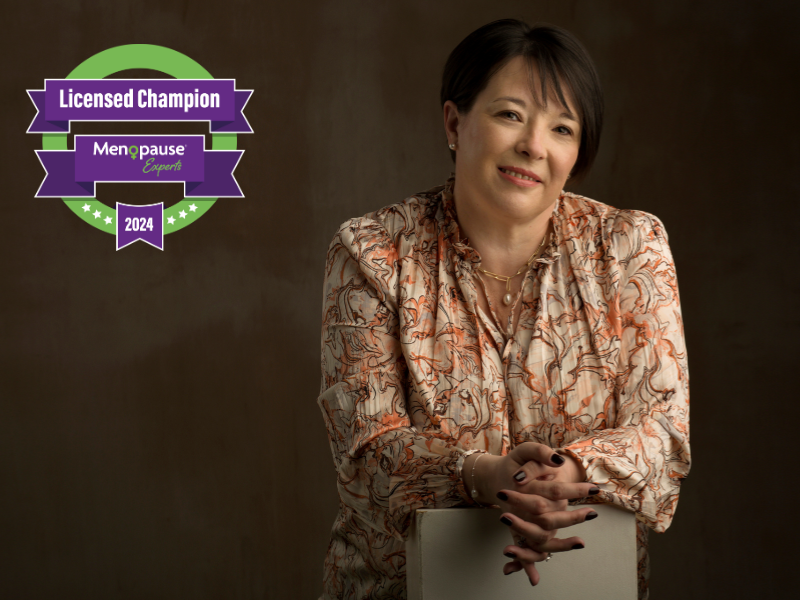Recently, several people have asked me why I have become a Menopause Licensed Champion with the Menopause Expert Group. To answer, I would like to share a personal journey that I have juggled since I was 11.5 years old. When I lived in the USA for 5 years, I also struggled to get any conversation with my GP or Gynaecologist on my symptoms as the USA is very behind the time with Menopause. A Nurse once said to me “Ms Allison, anything from the hip down the US Government do not acknowledge Female health issues”!
The important thing for me is that if my personal story helps others or makes them stop and think, then sharing it has made a difference no matter how small.
The beginning of my journey
As an 11.5-year-old, I was thrust into the realm of monthly menstrual cycles before even starting high school. It was the summer of 1983, just weeks before this new chapter. Already filled with anticipation and anxiety about moving from primary school to high school, I was further burdened by an unexpected and distressing experience. I remember the day when I thought I was dying. Frantically, I wrote a letter to my mum, explaining what was happening and asking her to hurry home. My brother, five years older, became my carrier pigeon, delivering the heavily taped envelope. After what felt like an eternity, my mum arrived, reassured me, and sent me to the chemist with a note. This traumatic experience left a vivid memory that I carry to this day.
From then until I was 18, I endured monthly blackouts, often collapsing from excruciating pain. These episodes frequently kept me from school, and my mother had to write embarrassing notes to excuse me from physical education classes.
Medical mismanagement
Our family doctor suggested the contraceptive pill at just 12 years old, much to my dad’s horror. I also discovered that my mother had experienced similar issues, revealing a genetic link. My mother had a hysterectomy at 38 after having children, but I lived with extreme pain and discomfort for nearly two decades and the contraceptive pill was all that was on offer. I married at the age of 30 and when I struggled to conceive, my GP dismissed my concerns and said just keep trying, one day you will hit the target! . I knew that something wasn’t right, but I actually thought that due to being on the pill since 12, 18 years by then, that I had created the issue of not falling pregnant. My husband suggested we go private and whilst in the waiting room at the private hospital, he was reading an article and said to me you have PCOS, I had never heard of it but after a scan I was diagnose Polycystic Ovary Syndrome (PCOS). This diagnosis was particularly impactful, as it also manifested in my father through male-pattern baldness and cardiovascular issues, conditions previously unknown in our family. When I was 38, I had taken quite ill and again back at BUPA but a different Gynaecologist who then delivered the news that I also had Endometriosis. Again lack of support and the only offer was for IVF again. I still live today with both and for PCOS this can spread to other organs without you even knowing.
Emotional and physical struggles
For many months and years, I struggled every month, yet I still dragged myself to work, laden with painkillers. On one occasion, while working for Sky TV, I had to go to the hospital due to severe pain and was misdiagnosed with a miscarriage, this was way before I was diagnosed with PCOS. Being told this was mentally devastating, and not long after I was diagnosed with PCOS I started IVF. This made my monthly symptoms even worse and by the age of 34, I decided my body and mind could not take physically or mentally take any more, and I had to accept that I would not have children. Despite limited support and information from both the GP and BUPA, I declined further IVF, believing that some people, like me, were not meant to have children.
Workplace insensitivity
While going through IVF, I confided in a supportive manager, who then left the business. My new manager provided a horrific evaluation, insinuating that my dedication to work was due to being unable to have children. At 30, in a junior manager position, I felt powerless against a senior colleague. Fortunately, I was headhunted by another company just in time. This experience highlights the additional challenges women with reproductive health issues face in the workplace.
Why I am telling you this now?
Empowerment through education by sharing my journey is crucial. It explains why I joined Menopause Experts and pursued training and accreditation. For the first time, I feel equipped to manage my perimenopause and menopause symptoms and support others in similar situations. My story is a testament to the importance of proper medical care, workplace understanding, and the power of education and advocacy in managing women’s health issues.
Chronic conditions like PCOS, endometriosis, and menopause are not cured by antidepressants. These conditions affect our hormones, which are critical to daily bodily functions. Despite this, medical students receive little information on these conditions, which is unacceptable in today’s world.
There are over 15.5 million women in the UK and around 1 billion globally going through menopause. The Menopause Experts Group operates worldwide in 20 countries, with only 1,000 licensed champions. My desire to be a Menopause Licensed Champion stems from wanting to take control of my menopause journey and support others.
In your workplace, menopause may still be hidden. Some companies focus on menopause support for women, but it’s also about those who manage women. Menopause can start as early as 35, or sooner due to medical reasons. The key to support is providing managers, both male and female, with the insight and tools to support women. It’s about taking control and managing symptoms, which can persist for many years.
The cost to hire someone in a business is just over £6,000, according to the CIPD. Losing a woman going through menopause far outweighs this cost in terms of financial loss and years of skills. Making supportive changes is not as costly as you might think; it shows that you care and helps normalise the experience of menopause, removing the taboo.
By sharing my journey, I hope to bring some normality to the conversation about menopause and encourage women to share their experiences. Together, we can learn, support each other, and manage the symptoms of menopause, allowing women to continue thriving in their personal and professional lives without fear of saying the word or having to leave a job as its easier than saying they need some adjustments at work to help them. We provide many adjustments for people that are pregnant or have a disability and whilst menopause is not a disability, it does require some adjustments to make a woman feel comfortable to continue to perform her job with respect and dignity – not be seen as useless and past her sell by date!

